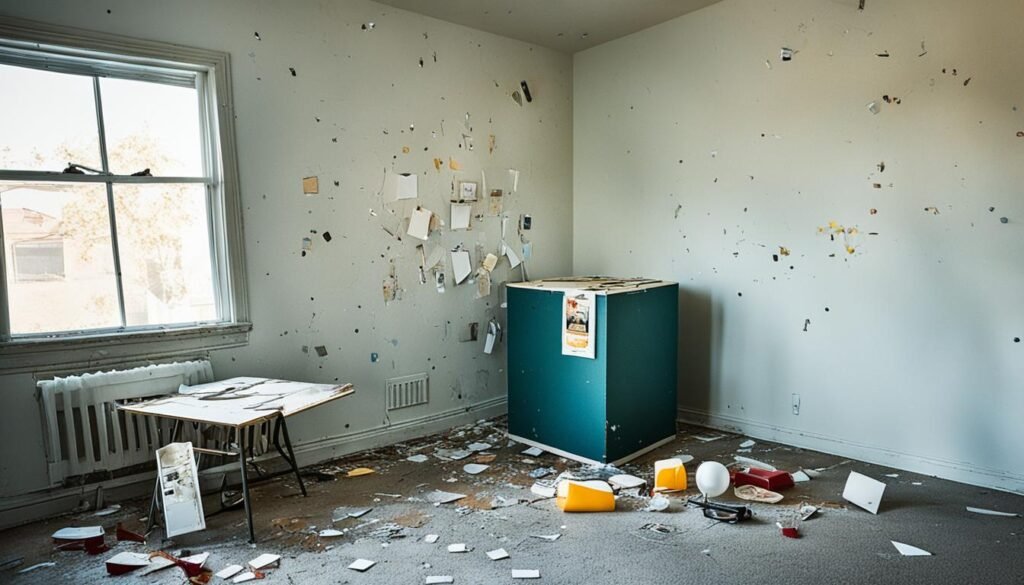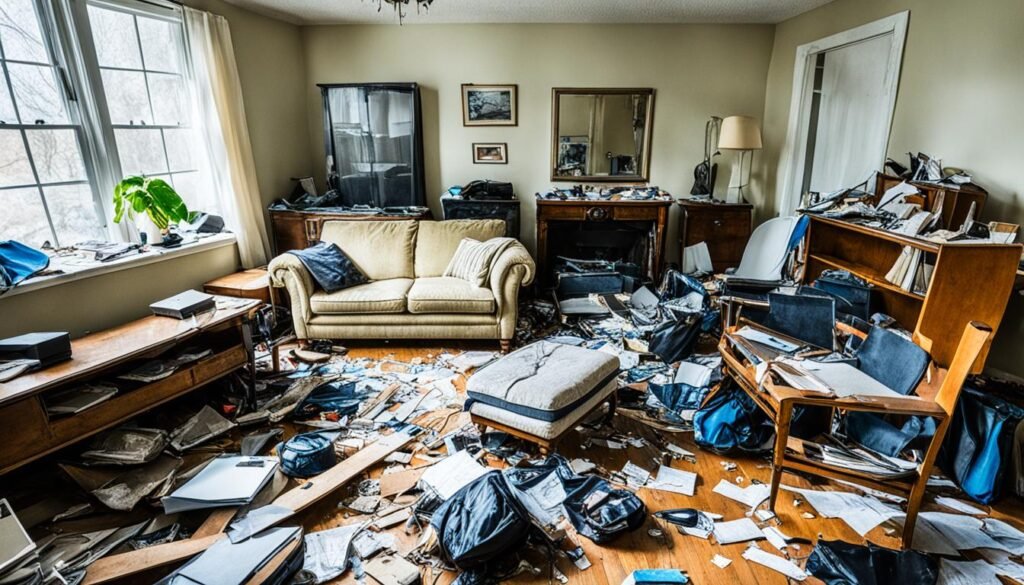Have you ever been in a situation where a tenant left their stuff after moving out of your rental? As a landlord, dealing with this can be tough. You need to make sure their items are safe and handled properly. But it’s crucial to know the laws you must follow, such as the Torts (Interference with Goods) Act 1977. This act lays out your responsibilities when tenants leave things behind.
Key Takeaways
- The Torts (Interference with Goods) Act 1977 protects goods left behind by tenants in a rental property.
- Landlords must give tenants 21 days’ notice to collect their goods.
- Landlords can deduct storage and sale fees from the proceeds of the sale of uncollected items.
- Landlords must keep any remaining money aside for the tenant for at least 6 years, even if the tenant cannot be found.
- Landlords should include clauses in the tenancy agreement regarding the disposal of items left behind.
Dealing with Abandoned Tenant Belongings
When tenants leave their things in a rental, landlords have duties under the Torts Act 1977. They are seen as “involuntary bailees.” This means they must look after these items. Before they can sell or throw them away, the landlord must try to find the tenant.
Understanding the Torts (Interference with Goods) Act 1977
The Torts Act protects the things tenants leave behind in rentals. Landlords should give tenants 21 days to get their stuff. If it’s not picked up, they can sell it. The money from sales can cover storage and selling costs. Any extra money the landlord makes, they must save for the former tenant for at least 6 years.
Identifying the Landlord’s Role as an Involuntary Bailee
2 About 28% of tenants might forget their belongings when they move out. The Torts Act 1977 allows landlords to get rid of these items after trying to contact the tenant. If they decide not to sell the items, they must be disposed of properly. Goods should be kept safe and efforts made to find the tenant.

Notifying the Tenant: Legal Requirements
If a tenant leaves items in a rental spot, the landlord must tell them. This rule comes from the Torts (Interference with Goods) Act 1977’s Schedule 1. It protects what’s left by tenants.
Drafting a Schedule 1 Notice
The landlord sends a Schedule 1 Notice. This goes to the tenant’s known address. They also leave a copy at the property. The notice says where the goods are, if they’ll be sold, where they will sell, and about costs.
Tracing the Tenant’s Whereabouts
When the landlord doesn’t know where the tenant is, they must try to find them. This might mean asking people who might know, checking on social media, or hiring a company to trace them.
Allowing Reasonable Time for Collection
After sending the Schedule 1 Notice, the tenant gets around 21 days to pick up their stuff. This is a fair period landlords should give.
Following these rules helps landlords deal with left items right. It’s fair to the tenant and looks after the landlord’s needs too. Everyone’s rights are protected this way.
My Tenant Left Belongings Behind: Landlord’s Guide
Storing the Abandoned Goods Safely
As a landlord, you have to keep any left-behind goods safe. This could mean at the property or somewhere else secure. This includes spots like a garage, shed, or a storage place. You might even use a spare room of yours.1 You’re legally bound to look after the tenant’s things until you’ve tried enough to find them.
Obtaining Permission to Dispose or Sell
If your tenant has okayed the disposal or sale of their items, keep proof of this chat. This way, you’re guarded against claims of selling their stuff without proper permission.
If getting hold of your tenant is impossible, and they haven’t said you could sell their stuff, the law lets you sell the items. The big rule here is the tenant must not have picked up their goods when they should have according to the agreed time. You must also show you tried really hard to get in touch, especially if they left without giving a new address.

| Procedure | Details | |
|---|---|---|
| Storing Abandoned Goods | Landlords must store uncollected items in a safe place until reasonable steps have been taken to trace the tenant. | |
| Giving Notice to Tenants | Landlords must give tenants at least 21 days’ notice to collect their belongings, though longer periods can be offered. | |
| Deducting Costs from Sale Proceeds | Landlords can deduct storage fees, sale fees, and any money owed from the proceeds before returning the balance to the tenant. | |
| Retaining Unclaimed Funds | If the tenant cannot be located, landlords must keep the remaining sale proceeds for at least six years. |
Selling or Disposing of Uncollected Belongings
When tenants leave things behind, the landlord must store them. Later, the goods may be sold. This process often comes with costs. At first, the landlord covers these bills. Then, they take these costs from the sale’s earnings. The sale money doesn’t just line the landlord’s pockets. They have to manage it correctly.
Deducting Storage and Sale Costs
Sale costs, like storage and fees, should be taken out of the sale money. Also, does the tenant owe rent? If yes, this amount can be deducted too.
Accounting for Sale Proceeds
If there’s money left, the landlord must try to give it back to the tenant. Even if they can’t find them, the landlord keeps the money for the tenant for 6 years. When a tenant is not contactable, the items can be sold. This is after the landlord has tried to locate the tenant.
Dealing with Abandoned Pets
If a tenant leaves their pets when moving out, it’s a big issue for the landlord. The animals can’t stay alone in the property. This is because they need food, water, and bathroom breaks. Also, they might damage the property.
Contacting Animal Welfare Organisations
For larger pets like cats and dogs, it’s wise to contact the RSPCA, the Cats Protection League, or a local animal charity. They can help by picking the animal up and caring for it. They might even take legal steps against the tenant.
Temporary Pet Fostering Options
But what about animals that are smaller, like hamsters, rabbits, or fish? They can find a temporary home with someone the landlord knows. Or, the RSPCA can be contacted for help or pick-up advice.5
Conclusion
Dealing with a tenant’s leftover belongings is a tough task for landlords. They need to follow strict laws from the Torts (Interference with Goods) Act 1977 seriously. This helps them avoid any legal issues.3
First, landlords must tell the tenant about the left items. They must store these items safely. Then, they need to know the right way to sell or throw away what’s left.
If there are pets left, landlords should make sure they’re looked after properly.
Staying on top of the law and regulations is very important for landlords. Doing so helps them deal well with abandoned items and not harm their rental business.
Before they take over an abandoned property, landlords need to do thorough checks. This prevents them from breaking the law.
The Torts Act has clear instructions on what landlords must do with left items. It even says they can get rid of these items if they can’t find the tenant and they’ve given notice
Understanding the law and being hard-working can make this situation easier for landlords. It helps them keep their business running well. By respecting tenant’s rights and going through the right steps, landlords protect themselves. This also ensures the next person moving in has a smooth start.




